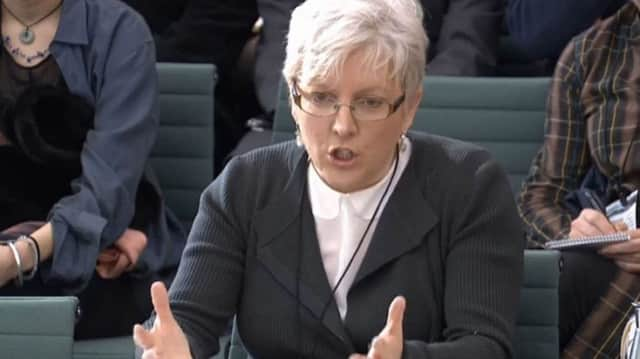BBC China editor told she was '˜in development' in gender pay row


Ms Gracie, who resigned as the BBC’s China editor in a row over unequal pay, fought back tears as she gave evidence to the Digital, Culture, Media and Sport Committee at the House of Commons this afternoon.
She recounted the effect the situation has had on her mental health, recalling how when she received an inaccurate account of a grievance she had filed she “went to bed for two days and thought ‘I can’t do it, this is too big’”.
Advertisement
Hide AdShe said: “The mental health issues that Michelle (Stanistreet) talks about people facing, the strain of being in conflict and the delays and the obfuscation and the opacity and the belittling of your work because that is what has to happen if they are not going to concede, they are going to have to crush your self esteem about your work so that is very painful. I found all of that really hard.
“I feel very angry about what they (the BBC) have put some other people through. I feel angry about some of the things I’ve seen and heard and some of the women and the suffering they have gone through. It’s not funny.
“All of these women have been underpaid, I believe, for years.”
Ms Gracie earlier spoke of what she said was a “toxic work atmosphere”. She warned BBC management, saying: “ It is going to get worse. We have women leaving, the credibility of management is diminished and damaged and they will lose in employment tribunals.
“They are stumbling towards a Greek tragedy where they make happen their own worst fears. They need to stop now, pull up and trust their staff.”
Early on in the session, Ms Gracie told how she had been earning £135,000 before the BBC offered her a £45,000 rise, which she rejected.
Advertisement
Hide AdShe said she had received results of a grievance last week and the BBC had said it had inadvertently underpaid her since 2014.
Ms Gracie said the BBC had not described her pay discrepancy as gender pay discrimination.
Advertisement
Hide AdShe said: “They have said it was not gender pay discrimination, they haven’t called it pay discrimination either.
“I’m not an employment lawyer, but it sounds to me like a tacit admission that it is pay discrimination in that they want to pay me now nearly £100,000 in back pay.
“The thing that is very unacceptable to me is they have basically said in the previous years – 2014, 2015, 2016 – I was in development.
“It is an insult to add to the original injury. It is unacceptable to talk to your senior women like that. I would have never agreed to China on those terms.”
The BBC was forced last summer to reveal the salaries of all stars earning more than £150,000 a year.
Ms Gracie was not on the list, while other international editors were.
Advertisement
Hide AdNorth America editor Jon Sopel was in the £200,000 to £249,999 bracket while Middle East editor Jeremy Bowen earned between £150,000 and £199,999.
It has since been revealed Mr Sopel, alongside other broadcasters John Humphrys, Huw Edwards, Nicky Campbell, Nick Robinson, and Jeremy Vine, have taken a pay cut.
Advertisement
Hide AdMr Humphrys was criticised after a leaked tape showed him joking with Mr Sopel about Ms Gracie and the gender pay gap.
A review, commissioned by the BBC and published yesterday, found there was “no evidence of gender bias in pay decision making”.
BBC Director-General Tony Hall will also be appearing before the committee.
